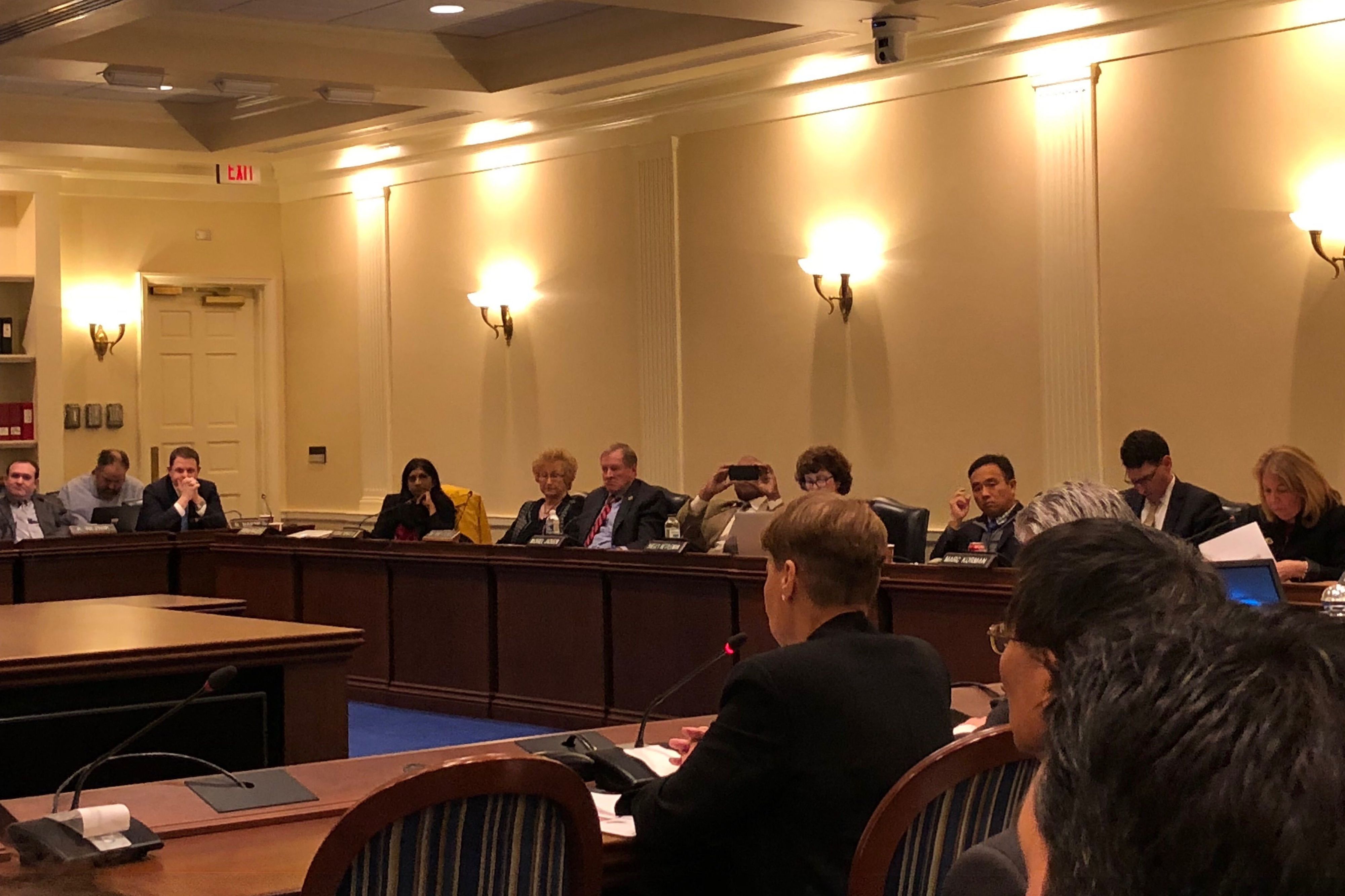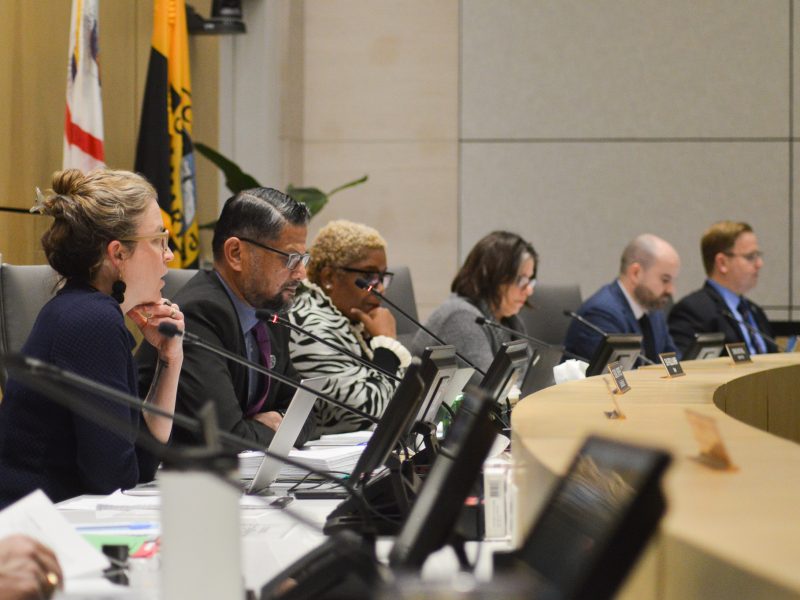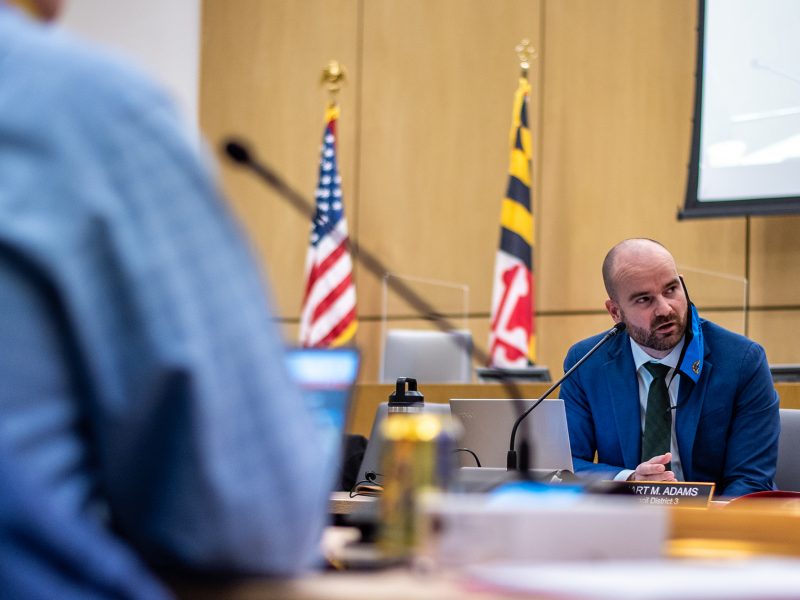The University System of Maryland’s Board of Regents backed legislation that would expand its membership and require it to be more transparent during hearings in the Maryland General Assembly this week.
Board chair Linda Gooden, along with University of Maryland Student Government Association President Jonathan Allen, traveled to Annapolis to voice their support for the bills as lawmakers reviewed their contents in state House and Senate hearings on Tuesday and Wednesday, respectively.
The bills — which are currently moving through the House Appropriations Committee and the Senate’s Education, Health and Environmental Affairs Committee — would expand the Board of Regents from 17 to 21 members and require its open meetings to be publicly streamed.
These reforms would improve the way the board operates and increase its transparency, Gooden told lawmakers in both hearings.
“The perception that public business is being done in private raises suspicion and breeds mistrust that can be damaging,” Gooden said on Wednesday. “Components of this bill will help further strengthen the board, making it more representative, more transparent, and better focused on its core functions.”
[Read more: Following the investigation into Maryland football’s culture]
The four new spots on the board would be filled by the state commerce secretary, appointees from the leaders of the House and Senate and a non-voting student member in addition to the current voting student member.
Additionally, the bill would require that at least one regent have a background in higher education administration, one have a background in finance and one have a background in diversity and workplace inclusion.
It would also double student regents’ terms to two years, allowing the non-voting student regent to gain experience on the board before becoming a voting member. Of the proposed reforms, this was the only one that Gooden raised concern over.
“Not because we don’t think students are very valuable parts of the board, but because we realize how much work it is for our students,” she said.
[Read more: After Maryland football controversy, USM will undergo its first external review in two decades]
The bills have the backing of 38 state lawmakers in the House and Senate, including Sen. Sarah Elfreth (D-Anne Arundel) and Sen. Jim Rosapepe (D-Anne Arundel and Prince George’s), both former regents. The House version of the bill is sponsored by Del. Ben Barnes, (D-Anne Arundel and Prince George’s). Barnes and Rosapepe’s district includes this university’s campus.
“I think we can all agree that some decisions that were made last fall by the University System of Maryland Board of Regents seemed to break the public’s trust in how that board governs higher education in Maryland,” said Elfreth, who is sponsoring the bill in the Senate.
The board, which sets policy for the system’s 12 member institutions, came under fire in the fall for its handling of two investigations surrounding the death of Maryland football offensive lineman Jordan McNair, who succumbed to heatstroke two weeks after first falling ill during a May team workout.
One investigation found that trainers failed to recognize that McNair had heatstroke and did not treat him properly. Nonetheless, the regents recommended the university keep the trainers responsible on staff.
In the other investigation, the board noted widespread abuse in the football program, but disputed the notion that its environment was “toxic,” contrary to prior reports by ESPN. Then-regents chair James Brady recommended in an October press conference that football coach DJ Durkin and athletic director Damon Evans keep their jobs.
Despite the board’s recommendation, university President Wallace Loh fired Durkin a day later.
After facing criticism for the board’s recommendations, Brady stepped down on Nov. 1 and was replaced by Gooden, who apologized to McNair’s family.
During the same October press conference, Loh announced he’d retire in June 2019. But last month the regents announced that Loh will remain in his role for an extra year.
That same day, the university system also announced that it had commissioned an independent external review of the board’s structure and policies — its first in two decades. That review is expected to be completed next month and will be made available to the public, Gooden said Wednesday.
At both hearings, Allen said the board’s actions in the aftermath of McNair’s death demonstrated a “complete disregard for transparency and shared governance in its handling of personnel decisions at the University of Maryland.”
“The recommendation to reinstate then-coach DJ Durkin and the three-month silence on the future leadership of the state’s flagship institution underscored the importance of communication with regards to major decisions that impact the campus community,” he said.
On Tuesday, Del. Marc Korman (D-Montgomery County) also took issue with the board’s handling of discussions surrounding Loh’s retirement. He asked Gooden if these discussions had happened behind closed doors. She said they had, but that the announcement of his continued tenure had been open for public comment.
“I guess, then, we need Delegate Barnes’ legislation on transparency,” Korman said.
Then, on Wednesday, Sen. Arthur Ellis (D-Charles County) stressed that the university system shouldn’t lose sight of its mission — something he said the leadership has done during recent events.
“It’s not real estate, it’s not personalities of the leaders, it is the students,” said Ellis, a 1983 graduate of this university. “The students are the reason why the university — the system — exists, period. Without that, it would be a failure.”



